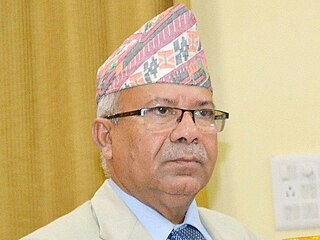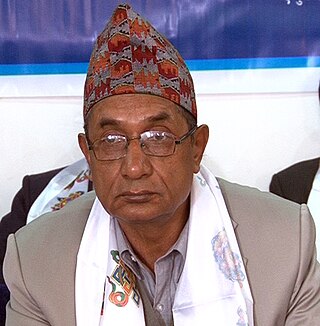
The Communist Party of Nepal (Maoist Centre) (Nepali: नेपाल कम्युनिस्ट पार्टी (माओवादी केन्द्र)), abbreviated CPN (Maoist Centre) or CPN (MC), is the third largest political party in Nepal and a member party of Samajbadi Morcha. It was founded in 1994 after breaking away from the Communist Party of Nepal (Unity Centre). The party launched an armed struggle in 1996 against the Nepalese government. In 2006, the party formally joined mainstream politics after signing a peace agreement following the 2006 Nepalese revolution.

The Communist Party of Nepal (Unified Marxist–Leninist) (Nepali: नेपाल कम्युनिष्ट पार्टी (एकीकृत मार्क्सवादी-लेनिनवादी), romanized: nēpāl kamyuniṣṭ pārṭī (ēkīkṛt mārksavādī-lēninavādī); abbr. CPN (UML)) is a communist political party in Nepal. The party emerged as one of the major parties in Nepal after the end of the Panchayat era.

The Communist Party of Nepal (Marxist–Leninist–Maoist), abbreviated CPN (MLM), was a minor communist party in Nepal. The party was as founded in 1981 by Krishna Das Shrestha. Initially known as the Nepal Marxist-Leninist Party, Shrestha had broken away from the Bagmati District Committee, which functioned semiautonomously, of the Communist Party of Nepal in 1969. Krishna Das Shrestha was the party president.

The Communist Party of Nepal , abbreviated CPN (UC–M) was an underground communist party in Nepal. The CPN (UC–M) was formed in 2002 through the merger of Communist Party of Nepal and Communist Party of Nepal (Masal).

The Communist Party of Nepal (Unity Centre) was a communist party in Nepal. CPN (UC) was formed on 19–20 November 1990 through the merger of Communist Party of Nepal (Mashal), Communist Party of Nepal (Fourth Convention), Proletarian Workers Organisation, and Communist Party of Nepal (Janamukhi). Soon thereafter, a group led by Baburam Bhattarai and Shital Kumar, who had left Communist Party of Nepal (Masal), joined the party. Samyukta Janamorcha Nepal was set up as the open mass front of the party.

The Communist Party of Nepal (Fourth Convention) (Nepali: नेपाल कम्युनिष्ट पार्टी (चौथो महाधिवेशन), Nepala Kamyunishta Parti (Chautho Mahadhiveshan)) was a communist party in Nepal 1974–1990. It was the major communist group in Nepal during the latter part of the 1970s, but gradually lost influence due to internal disputes. The party actively participated in the struggle for democracy in 1990, and its leader took part in writing the Nepalese Constitution. It later merged with other forces to form the Communist Party of Nepal (Unity Centre), out of which the Communist Party of Nepal emerged.

The Communist Party of Nepal (Masal) was a communist party in Nepal. CPN (Masal) was formed in 1983, following a split in the Communist Party of Nepal (Fourth Convention). The party was led by Mohan Bikram Singh.

The Communist Party of Nepal (Marxist–Leninist) is a communist political party in Nepal. It was formed by Chandra Prakash Mainali when the Communist Party of Nepal (Marxist–Leninist) reunified with Communist Party of Nepal. Mainali had refused to go along with the merger and led a faction of the former Communist Party of Nepal (Marxist–Leninist) to reorganize the party.

Madhav Kumar Nepal, is a Nepalese politician and former Prime Minister of Nepal. He served as prime minister from 32 May 2009 to 6 February 2011.

Dina Nath Sharma, alias Ashok, is a Nepalese politician. In 1999 he led a revolt within the CPN (Masal) against the party leadership. On April 6, 1999, Sharma split from the party and constituted his own parallel Communist Party of Nepal (Masal). Sharma's party called for boycott of elections and supported the armed struggle. Soon after the split, Sharma's party merged with the Communist Party of Nepal.

Mohan Bikram Singh, often referred to as MBS, party name Gharti, is a Nepalese communist politician. His father was a wealthy landlord in Pyuthan District who was close to King Tribhuvan. MBS however joined the opposition Nepali Congress in 1950, and took part in the 1950–1951 uprising for democracy.

Communist Party of Nepal was a communist party in Nepal. It was formed on November 15, 2005, through the merger of the Communist Party of Nepal (Marxist-Leninist-Maoist) and the Nepal Samyabadi Party (Marksbadi-Leninbadi-Maobadi). The party was led by Krishna Das Shrestra (chairman) and Nanda Kumar Prasai.

Janamorcha Nepal was founded in 2002 as the mass organisation and electoral front of the Communist Party of Nepal. It was formed following the merger between the Communist Party of Nepal and the Communist Party of Nepal (Masal) when their respective fronts Samyukta Janamorcha Nepal and the Rashtriya Jana Morcha joined together on 10 July 2002.
Communist Party of Nepal (Unified) (Nepali: नेपाल कम्युनिष्ट पार्टी (एकिकृत)) was a communist party in Nepal. The party was formed in 2007 through the merger of three groups:

The Nepal Communist Party, abbreviated NCP is a defunct communist party which existed in Nepal from 2018 to 2021. It was founded on 17 May 2018, from the unification of two leftist parties, Communist Party of Nepal and Communist Party of Nepal. The unification was completed by the Party Unification Coordination Committee, after eight months of negotiation. The two predecessor parties subsequently dissolved, making way for the new united party. The party retained the electoral symbol of the CPN (UML), the sun.

Narayan Kaji Shrestha, alias Prakash, is a Nepali communist politician currently serving as the Deputy Prime Minister of Nepal. He has been affiliated with a number of communist parties throughout his political career, holding leadership positions. He was a freedom fighter for the democratic movement to abolish the Panchayat system in the 1980s. He remained in the political mainstream during the Maoist civil war and acted as a mediator. After the peaceful settlement of the conflict, he formally joined the Maoist party and has held important political positions since 2008. He has held the offices of the Deputy prime minister of Nepal, Home minister, foreign minister, cabinet spokesperson, Member of Constituent Assembly and Member of Parliament, among others and currently serve as the home minister.

The United People's Front of Nepal, abbreviated SJM, was the front of the Communist Party of Nepal, or CPN (UC).
Rishi Kattel is the leader of one of the communist parties in Nepal. He is currently the Chairman of Communist Party of Nepal, which was formed in 2013 along with other communist leaders Lok Narayan Subedi, Jagat Bogati, Sharan Bikram Malla, Ram Bahadur Bhandari and Bhim Sedhai. He is the former chairman of Communist Party of Nepal (Unified).
Ram Bahadur Thapa, also widely known by his nom de guerre Badal, is a Nepali politician and former Minister for Home Affairs. He is the vice president of CPN (UML).

At the end of 2020, a major split in the Nepal Communist Party (NCP) revived the Communist Party of Nepal and the Communist Party of Nepal.








